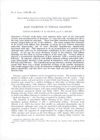Madarosis
November 2006
in “
Survey of Ophthalmology
”
madarosis eyelash loss eyebrow loss scarring processes non-scarring processes inflammatory processes hair cell cycle kinetics hormonal disturbances genetic factors endocrine disorders hyperthyroidism hypothyroidism diffuse alopecia corticosteroids minoxidil sensitizing agents prostaglandin analogs cosmetic approaches hair loss Rogaine

TLDR Madarosis is the loss of eyelashes and eyebrows due to various health issues and requires thorough examination to diagnose and treat the underlying cause.
The 2006 review on madarosis, a condition involving the loss of eyelashes and eyebrows, identifies it as a symptom of various health issues, including infectious diseases, autoimmune disorders, and malignant tumors. It can be caused by scarring processes, which are irreversible, or non-scarring processes, which may be reversible. The review stresses the need for a comprehensive clinical history and examination to diagnose potential life-threatening conditions associated with madarosis. It also explores the pathogenesis, including inflammatory processes, hair cell cycle kinetics, hormonal disturbances, and genetic factors. The document lists infectious agents, dermatological conditions, endocrine disorders, neoplastic causes, drug reactions, congenital factors, and trauma as potential causes. It notes that endocrine disorders like hyperthyroidism and hypothyroidism can lead to hair loss, with a significant percentage of cases presenting with diffuse alopecia. The review emphasizes the importance of patient history and examination in determining the cause of madarosis and suggests that isolated madarosis is often due to localized eyelid disease, while systemic or congenital causes may be indicated by associated hair loss elsewhere. Treatment options are varied and depend on the underlying cause, but may include corticosteroids, minoxidil, sensitizing agents, or prostaglandin analogs, with cosmetic approaches for scarring madarosis. The review underlines the importance of collaboration with dermatologists or physicians for non-ophthalmic causes of madarosis.








